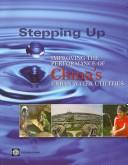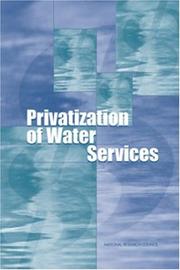| Listing 1 - 10 of 40 | << page >> |
Sort by
|

ISBN: 0821373315 9786611113254 1281113255 0821373323 Year: 2007 Publisher: Washington, DC : World Bank,
Abstract | Keywords | Export | Availability | Bookmark
 Loading...
Loading...Choose an application
- Reference Manager
- EndNote
- RefWorks (Direct export to RefWorks)
As China transitions to a market economy, municipal utilities are evolving into commercially viable companies under government oversight. Great challenges confront the reform process for China's water utilities, including rapid urbanization and emerging inequality, coupled with severe water scarcity and degradation. Cities and their water utilities must provide services within a complex mosaic of policies and regulations provided by national and provincial governments. In China, as throughout the world, water is also a sensitive political issue. Governments are keen to provide good water service
Electronic books. --- Water utilities. --- Water utilities --- Urban policy --- Management --- Business & Economics --- Industrial Management --- Water companies --- Public utilities --- Water-supply
Book
ISBN: 9780833089175 083308917X 9781605732107 1605732109 Year: 2014 Publisher: Denver, CO Water Research Foundation
Abstract | Keywords | Export | Availability | Bookmark
 Loading...
Loading...Choose an application
- Reference Manager
- EndNote
- RefWorks (Direct export to RefWorks)
Water-supply --- Water utilities --- Effect of global warming on. --- Risk management. --- Water companies --- Public utilities --- Global warming
Book
ISBN: 1281795119 9786611795115 354076707X 3540767061 Year: 2008 Publisher: Berlin ; London : Springer,
Abstract | Keywords | Export | Availability | Bookmark
 Loading...
Loading...Choose an application
- Reference Manager
- EndNote
- RefWorks (Direct export to RefWorks)
This statement in the most recent Human Development Report articulates a convention that has increasingly gained ground in the water community over recent years: the key challenge in the water sector is not a lack of water, knowledge, financial resources or technology. In general, it is the political sphere that determines whether or not water problems are solved, whether or not people have access to drinking water, irrigation water and sanitation, whether our natural resource base is developed sustainable or over-exploited, and whether new challenges for the water sector – such as adaptation to climate change – will be tackled or not. Politics (the process of decision-making of groups of people, involving the authoritative allocation of e.g. resources), the actors, their interests and interactions determine whether progress is made or hindered. The outcome of water politics is then reelected in water policies, the substantive outcome of the political interplay in terms of regulations, action programs or spending priorities of the various public or private entities concerned.
Water-supply --- Water resources development --- Water utilities --- Management --- Political aspects. --- Management. --- Finance. --- Water companies --- Public utilities --- Energy development --- Natural resources --- Availability, Water --- Water availability --- Water resources
Book
ISBN: 9264060316 9264060308 Year: 2011 Publisher: Paris : OCDE,
Abstract | Keywords | Export | Availability | Bookmark
 Loading...
Loading...Choose an application
- Reference Manager
- EndNote
- RefWorks (Direct export to RefWorks)
De nombreux pays ont sollicité le concours du secteur privé pour moderniser et développer leurs infrastructures en eau et en assainissement et améliorer l’efficacité des réseaux de distribution. Cet ouvrage constitue un catalogue cohérent d’orientations à l’intention des pouvoirs publics. Il couvre, notamment, la répartition des rôles, des risques et des responsabilités entre partenaires, les conditions d’un cadre institutionnel bénéfique et les arrangements contractuels susceptibles de permettre une coopération optimale avec le secteur privé et une meilleure utilisation des capacités de chacun.
Water utilities. --- Water resources development. --- Privatization. --- Denationalization --- Privatisation --- Water companies --- Contracting out --- Corporatization --- Government ownership --- Energy development --- Natural resources --- Water-supply --- Public utilities
Book
ISBN: 9264266453 9264266291 Year: 2016 Publisher: Paris : OECD,
Abstract | Keywords | Export | Availability | Bookmark
 Loading...
Loading...Choose an application
- Reference Manager
- EndNote
- RefWorks (Direct export to RefWorks)
A major challenge facing the Republic of Buryatia, subject of the Russian Federation, is how to balance the task of protecting Lake Baikal – a unique water object and ecological system included in the UNESCO list of World Natural Heritage Areas – with the need for dynamic and sustainable socio-economic development of the republic. This requires streamlining and improving water policy jointly with economic, administrative, information and other policy instruments. The recommendations in this report aim to help achieve this objective. They include the introduction of abstraction charges for irrigation water as a natural resource; enhancement of state support to the water sector; and improvement of economic instruments for managing risks of water-related hazards (such as compulsory insurance and differentiated land tax rates in flood prone areas). A few innovative instruments are also recommended for pilot testing such as establishing limits for discharges of certain hazardous substances in a pilot area (e.g. Selenga river basin) and progressive development of market for tradable quotas for discharges of the “capped” pollutants; and introducing a charge (tax) on toxic agricultural chemicals (pesticides, herbicides, etc.) and synthetic detergents so that to create incentives for the reduction of diffuse water pollution.
Water-supply --- Management. --- Availability, Water --- Water availability --- Water resources --- Natural resources --- Public utilities --- Water resources development --- Water utilities --- Energy development --- Water companies --- Russian Federation
Book
ISBN: 1282697757 9786612697753 0821379577 0821379569 Year: 2009 Publisher: Washington, DC : World Bank,
Abstract | Keywords | Export | Availability | Bookmark
 Loading...
Loading...Choose an application
- Reference Manager
- EndNote
- RefWorks (Direct export to RefWorks)
Public-Private Partnerships for Urban Water Utilities: A Review of Experiences in Developing Countries' analyzes the market growth of Public-Private Partnerships (PPPs) in the developing world since 1990, and the performance of more than 65 large water PPP projects-representing more than 100 million people-for access, service quality, operational efficiency, and tariff levels. Although a relatively small portion of the water utilities in the developing world are operated under PPPs (about 7 percent in 2007), the urban population served by private water operators has grown every year since 1990
Book
ISBN: 9812309837 9812309829 Year: 2013 Publisher: Singapore : Institute of Southeast Asian Studies,
Abstract | Keywords | Export | Availability | Bookmark
 Loading...
Loading...Choose an application
- Reference Manager
- EndNote
- RefWorks (Direct export to RefWorks)
Water has been dubbed the "oil of the 21st century" because of its increasing global scarcity. In Southeast Asia, water resources have been strained by the greater demand from different sectors such as agriculture, industry and domestic users. This situation is only likely to worsen in the future if active measures are not taken now. Is there a standard framework that can be adopted to promote cooperation in the use of water among countries? Could clearer institutions in river basins provide the backdrop for a more effective water management strategy in Southeast Asia? Does private sector involvement or privatization resolve some of the "public good" woes of water management? How does a sense of security and ownership enhance sustainability measures in a country? How have civil groups been able to promote effective water management in a country? How have water shortages been overcome in a predominantly urban city state? How have water pollution problems been resolved? Is there a potential for water conflicts in the years to come? What are some of the issues involved in sustainable watershed management? This publication draws from regional and country studies of the Mekong Basin, Malaysia, Indonesia, Singapore, Thailand and the Philippines to understand the political and socio-economic dynamics involved in water management. It is a must read for anyone interested in water management issues in the region, understanding the past and present and also looking to future trends.
Water-supply --- Water utilities --- Water resources development --- Energy development --- Natural resources --- Water companies --- Public utilities --- Availability, Water --- Water availability --- Water resources
Book
ISBN: 9264230149 9264230106 Year: 2015 Publisher: Paris : OECD Publishing,
Abstract | Keywords | Export | Availability | Bookmark
 Loading...
Loading...Choose an application
- Reference Manager
- EndNote
- RefWorks (Direct export to RefWorks)
This report focuses on the urban water management challenges facing cities across OECD countries, and explores both national and local policy responses with respect to water-risk exposure, the state of urban infrastructures and dynamics, and institutional and governance architectures. The analyses focus on four mutually dependent dimensions – finance, innovation, urban-rural co-operation and governance – and proposes a solutions-oriented typology based on urban characteristics. The report underlines that sustainable urban water management will depend on collaboration across different tiers of government working together with local initiatives and stakeholders.
Water utilities -- OECD countries -- Management. --- Water-supply -- OECD countries -- Management. --- Industrial Management --- Management --- Business & Economics --- Water utilities --- Water-supply --- Management. --- Availability, Water --- Water availability --- Water resources --- Water companies --- Natural resources --- Public utilities --- Water resources development

ISBN: 0309074444 9786610184682 128018468X 0309512085 9780309074445 9780309512084 0305074444 0309170761 Year: 2002 Publisher: Washington, D.C. National Academy Press
Abstract | Keywords | Export | Availability | Bookmark
 Loading...
Loading...Choose an application
- Reference Manager
- EndNote
- RefWorks (Direct export to RefWorks)
POLITICAL SCIENCE --- Public Affairs & Administration --- Waterbedrijven: USA --- Waterbedrijven: USA. --- Water utilities --- Water-supply --- Sewage disposal --- Privatization --- Economic aspects --- Water companies --- Waste disposal --- Availability, Water --- Water availability --- Water resources --- Public utilities --- Refuse and refuse disposal --- Natural resources --- Water resources development
Book
ISBN: 9715610420 Year: 1993
Abstract | Keywords | Export | Availability | Bookmark
 Loading...
Loading...Choose an application
- Reference Manager
- EndNote
- RefWorks (Direct export to RefWorks)
Water utilities --- Water-supply --- Statistics. --- 813 Methodologie --- 822.3 Internationale economische organisaties --- 825 Ontwikkelingssamenwerking --- 835 Natuurlijke rijkdommen --- 838.1 Ecologie --- 883 Azië --- 885 Oceanië --- Water companies --- Public utilities --- Availability, Water --- Water availability --- Water resources --- Natural resources --- Water resources development --- Statistics
| Listing 1 - 10 of 40 | << page >> |
Sort by
|

 Search
Search Feedback
Feedback About UniCat
About UniCat  Help
Help News
News